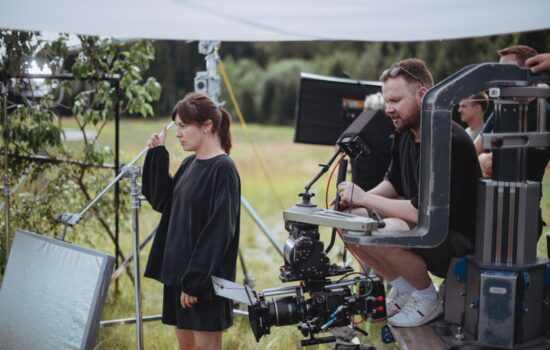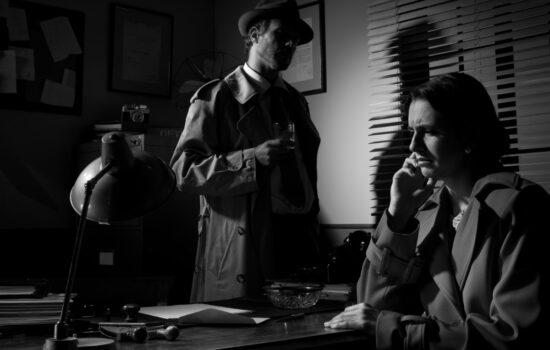Festival Programmer
Career Overview
Festival Programmers are in charge of sourcing and selecting the most appropriate films for their respective festivals, whilst also taking responsibility for the smooth running of the festivals themselves.
Alternate Titles
Programming Coordinator, Programming Manager
Avg. Salary
$63,4431
Salary Range
$44K – $102K1

How To Become a Festival Programmer
People also ask
Career Description
Paul Sloop, Short Film Programming Manger for Cleveland International Film Festival, lays out the nuts and bolts of his job as a Festival Programmer: “Daily responsibilities depend on where we are in the cycle. After our festival ends, for many months, I’m preparing for the next festival.”
He explains that he keeps a close eye on other festivals to see what they’re playing and to take note of films he hasn’t yet seen. He goes on, “I reach out to many of those filmmakers to get eyes on their work. Soon after that, our festival opens for submissions and a pool of entries starts to arrive.”
This is when Sloop and his extensive team start watching films in earnest. Cleveland International receives over 3,000 submissions, which are then whittled down to 700 contenders.
“My day is a combination of sending emails (to filmmakers, or to other festivals to share or request information), watching a lot of films, making notes on them and tracking the trajectory of filmmakers and their work.”
Sloop goes the extra mile for filmmakers: “It’s a barren wasteland out there and I like to be a small ray of light — I can’t guarantee their films are going to get in, but I want them to know they did a great job, and their work is appreciated. I like communicating early with them — I don’t want filmmakers to feel they’re sending money down the rabbit hole. It’s about building relationships.”
Sloop personally watches over 1,500 shorts every year. As the festival closes in, he spends a lot of close time with his programming team: “At that point, we’re narrowing down the list and getting into the very difficult part of making the final selections.”
Sloop manages the Cleveland programming team, including a huge pool of one hundred and fifty volunteers who watch and score the first round of three thousand short film entries (three people watch every film). “We expect them to make notes and provide constructive criticism because we are one of the few festivals who offer filmmakers that feedback after the festival,” he explains.
The 700 top-rated shorts are then evaluated by the five-person programming team. “Once the Official Selection is squared away, my focus switches from watching and enjoying films to a mostly administrative job. The next ten weeks are all emails to the filmmakers and getting information back from their production teams: press stills, film files, write-ups (I do most of these), crew and credit information, and guest details.”
Sloop clarifies that Festival Programmers then take on a different role — being in charge of much of the physicality of the festival itself: “I introduce the programs, do the Q&As with the filmmakers in attendance and show up at the evening parties with the filmmakers.” And then the festival ends, after which Sloop says, “Then you start all over again!” For many Festival Programmers, the period after the festival end is quieter.
However, Sloop doesn’t like to stop entirely, saying, “I just slow the pace for a while, only taking on two or three short films a day, casually watching. The next major festival opening after ours is Tribeca and I like to see what they’re up to.”
Sloop is also the Director of Programming and Operations for Film Pittsburgh so he doesn’t get a lot of downtime: “All in all, it’s five events per year — for me, from mid-May to mid-June, there’s nothing too pressing and that’s my time to take a little time to myself. Once Palm Springs Film Festival starts, I treat that as the beginning of my festival season again.”
What is a Festival Programmer?
A Festival Programmer is an individual who is involved in the sourcing and selecting of movies for a film festival. Depending on their specific role and responsibilities, a Festival Programmer may reach out to Filmmakers about submitting their projects for their festival, reviewing submissions, deciding which ones will be selected, and coordinating the scheduling of those films for the event.
Salary
The average annual salary for Festival Programmer is approximately $63,400. The salary range for Festival Programmers runs from $44,000 to $102,000.
Before rising to the level of a Festival Programmer, there will be long periods of unpaid, volunteer work: “The reality is you’re going to spend some time being paid nothing at all and, after that, the path is completely different for everyone.”
Nonetheless, Sloop does give some insight into the pay structure once you’re managing a Programming Team: “I’m still an independent contractor for both of my organizations — I am paid an annual amount that gets chopped up and paid monthly. It works nicely that way.”
How much do Film Programmers make?
Many film festivals are independent, grassroots events, meaning that the Festival Programmers who work for them may do so on a pro bono basis. That being said, for more high-profile festivals such as Sundance Film Festival or Toronto International Film Festival, budgets allow for paid positions. In such cases, a Festival Programmer may earn anywhere from approximately $39,000 to $115,000 in a given year. According to ZipRecruiter, the average annual salary for a Film Programmer is around $66,000.
Hey, what do you think about trying our new Film Career HelperFilm Career Helper really quick? It’s totally free and could help get your career moving fast! Give it a try. It’s totally free and you have nothing to lose.
Career Outlook
This is where Sloop has positive news for anyone serious about pursuing this career: “I work most of the time from home, so I have a lot of face time with my family. Other than when the festivals are actually running, or I’m not traveling to events two or three times a year, I operate from home.”
Festival programming offers real quality of life for anyone with (or looking to have) a family.
Sloop talks about his personal experience: “My kids have become huge film fans and they love my job because they get to meet cool filmmakers. They actually help me curate the family films in the festival because they’re aimed specifically at a younger audience. We can have a film that, as an adult, you think has a sweet story, a beautiful family message, but they watch it and say, ‘That’s boring.’ So I get a lot of insight from them.”
Career Path
In terms of a career trajectory, Sloop makes clear that becoming a Festival Programmer starts with an undying passion for film: “If you’re interested in this kind of work, volunteer at the biggest film festival closest to you. In fact, I know a lot of people who are previewers for multiple festivals — we need people with a solid skillset. If you have a good eye for film, reach out to multiple places.”
He paints a picture of the festival world as being fairly small: “We all know people who are good. If a festival needs someone full-time on their programming team, festivals communicate with each other — it tends not to be a job listing.”
Sloop himself started in an unpaid capacity at the Cleveland Film Festival: “Seventeen years ago, I was a volunteer. Then I ended up creating the way Cleveland did shorts. We used to do submissions back then, and the programming team would pick the best films and we would play them. But I knew there were more films out there and I went out and searched for those films — that way, we became partly curated.”
For Sloop, all his extra-curricular effort paid off: “We built a reputation and eventually the Academy reached out to us and asked us to become an Oscar-qualifying festival, both for shorts and eventually for docs. We are now one of the nineteen festivals that do all three.”
For anyone considering journeying into a film festival career, it takes hard, passionate work, but Sloop maintains that it will pay off for those that stick to it: “I used to send Jewish-produced short films over to Film Pittsburgh for their JFilm Festival. For five straight years, the winner was one of the films I sent over; once a programming position opened, I was offered the job. So that was a proactive volunteer journey for me.”
As for Cleveland International, Sloop says, “When I started, we would get 600 submissions. Now we get over three thousand. That’s why I had to build a team and get properly paid for the work.”
With regards to entry-level jobs specific to festival programming, it’s all about volunteering. That is the number one tried-and-tested route.
As Sloop points out, “Our volunteers tend to find us — or we find them — through our festival. Our volunteers are passionate followers and they come from all walks of life. They raise their hands, they’re willing to work, and they build a relationship with our Volunteer Coordinator.
“The reality is we have one hundred and fifty previewing volunteers and more than a thousand logistics volunteers to help out on the festival days. They’re the ones physically manning the theaters, scanning people in, helping with tickets and guiding the crowds. It’s a morning-to-night operation and it takes a huge team.”
All in all, Sloop has clear and simple advice, no matter your background or employment history: “Volunteer to get on the previewing team. That’s the best way in.”
- Sloop has an interesting suggestion to help fast-track your ambitions: “The other way of doing this is to start a small festival. Do your own, put together an event. Someone who has run a festival, who knows the ins and outs, they have an excellent chance of moving into a bigger programming team. I know a woman who does a screening at her public library and has built a passionate, monthly following of forty/fifty people. She now has years of experience and she could walk on to a programming team. It’s about being creative and passionate — if you curate on your own, you really can do this.”
- Watch films (a ton of films)!
Experience & Skills
Festival Programmers come from all walks of life. Cleveland’s programming team currently has a College Professor and a High School Teacher — so there are no steadfast rules in terms of requisite experiences or skills.
What is clear from Sloop’s experience is that if you have filmmaking experience, it comes with inherent trip-wires: “Many Programmers are filmmakers but they have to be careful about unpicking films from a technical perspective. They can easily lose the story early on and that does a disservice to the potential audience. Especially in short filmmaking, the technical expertise can be all over the place, but if the story works, that’s okay.”
Sloop goes on to advise potential Programmers: “Filmmakers tear things apart for things that an audience never sees. I don’t want do that. Flaws that filmmakers see are not the flaws that audiences see. I watch a film like an audience member, without the knowledge of how it was shot — I think that’s valuable for a Festival Programmer. If you’re putting together a major industry event, that’s not true, but most festivals are programmed for the audience.”
Clearly, that is worth remembering, no matter your educational or professional experience prior to the job.
There are several elements that Sloop highlights as vital for anyone with their sights set on programming: “An eclectic taste is very helpful — if you don’t have taste holes, it makes you a better Programmer and allows you the best chance of building a stellar reputation.
“At the very least, if you do have holes in your taste (say, you don’t like horror films), acknowledge that and delegate to someone else. As long as you know to turn it over, someone else can fill in. It’s about self-awareness.”
Moreover, it’s essential to remember that if you are going to build enduring relationships with filmmakers and the entertainment community, it helps to be good with people.
Sloop also points out, “It’s just as important to recognize that you don’t have to be right; you’re programming for an audience, not for yourself. You can’t fight against things that everyone else is telling you they really like. That’s how you achieve the broad reach you want — you have to be ready to listen to other voices.”
How do you become a Film Programmer?
There is no one way to become a Film Programmer. That being said, most individuals in this position have an educational background in film and/or have considerable experience in the curation and distribution of movies. As with many other specialties in film, it can be useful to enter the field by first volunteering at a film festival or working at a smaller event that is willing to take on less experienced individuals. From there, the skillsets and expertise required can be gained to eventually move on to bigger and higher profile film festivals.
Education & Training
Sloop insists that most people accidentally fall into festival programming, but if you really focus, it’ll take a couple of years to get noticed and get on a team. He goes on: “If you want to do this, it’s never going to hurt to have some background related to film.
If you go to college and study film, that can only help. Saying that, every Programmer I’ve worked with agrees on one thing — you get found because of your passion for the work because you volunteer.
“If you do it for free and festivals love your input, they know you’ll do even better once you’re paid. Your best route in is doing outstanding work, getting experience and demonstrating your knack for film. For my part, the guy before me was a Film Professor and he could see that I had an eye for film.”
He proffers some simple advice for aspiring Programmers: “Watch everything. I had parents that absolutely refused to let me watch films — they regarded them as evil! Then when I had a chance to watch them, I devoured everything!”
The first job Sloop ever got was as an Usher in a movie theater and he remembers, “It was the year Karate Kid and Beverly Hills Cop came out, an incredible summer for film. I would volunteer for every job there and finally became a Manager because I was willing to be there all the time!”
After that, Sloop puts it simply: “I started going to Cleveland Festival and ended up on the team.”
Additional Resources
There is no union representation for Festival Programmers, but the age of social media has seen the proliferation of more structured groups.
Says Sloop, “The most formal thing is something called the Film Festival Alliance — it’s a community that has sprung out of the digital age and their biggest presence is on Facebook. Every year they go to a festival — they came to Cleveland this year — and they run events for Programmers and anyone involved in the running of film festivals. Prior to that, it was just an informal network, but now we have this more organized setup.”
The best thing for people starting out is to keep an eye on the social media pages and formal websites of your closest major film festival. That way, you stay apprised of their upcoming events and you can be there in person to meet the organizers.
FAQ
What is the single biggest suggestion you would give to someone wanting to get into this career?
“Start. Go ahead and do it. This is not a traditional job and there’s no conventional route, so just start doing something. Go to your local library and put together a short film night. Volunteer at other festivals, get in the pool. You’re going to have to find out if you love it enough to work at it before you get paid. There are a lot of talented people and you’re not going to just walk in and start getting paid.”
What’s the #1 mistake people make when trying to get into this career?
“People taking credit for things they shouldn’t. On LinkedIn, someone requested to join my network — they had ‘Programmer at Tribeca, Denver, and Cleveland International Film Festival’ on their profile. We had to contact him to take it down — this guy was one of the 150 volunteers, not a Programmer. You can’t turn ‘volunteer previewer’ into Programmer! Don’t get ahead of yourself with titles and credits that you don’t have. You’ll get caught out!”
What is the question people should ask about this career but rarely do?
“Do I have the passion to do this until it becomes a paying job?”
If you could describe in one word what makes you successful, what would it be?
“Enthusiasm. I’ve converted a lot of people to short films because I’m so passionate and enthusiastic about them. Anyone who knows me knows short films are my thing.”
Sources

Paul Sloop
Paul Sloop has led the selection of short films for the Oscar Qualifying Cleveland International Film Festival since 2003. He grew up in Pittsburgh, then worked in theater management and exhibition for over fifteen years in Massachusetts, Rhode Island, and Ohio.
After building Cleveland into a globally renowned festival, Paul then added Director of Programming and Operations at Film Pittsburgh and Director of Programming for the Pittsburgh Shorts and Script Competition to his titles. He has served as a guest judge for festivals such as Salute Your Shorts Fest and Palm Springs Film Fest. He has also served as a panelist for film festivals like the Louisiana Film Prize and Palm Springs Film Fest.
Paul is an active public speaker and performs often in community theater in the Greater Cleveland area where he, his wife, and their six daughters have all shared the stage in numerous productions.
His career as a Film Programmer has been mentioned/featured in Indiewire, KTBS, and FreshWater Cleveland.
References
- 1. "Festival Programmer Salaries in United States". Glassdoor.com. published: December 14, 2019. retrieved on:



















